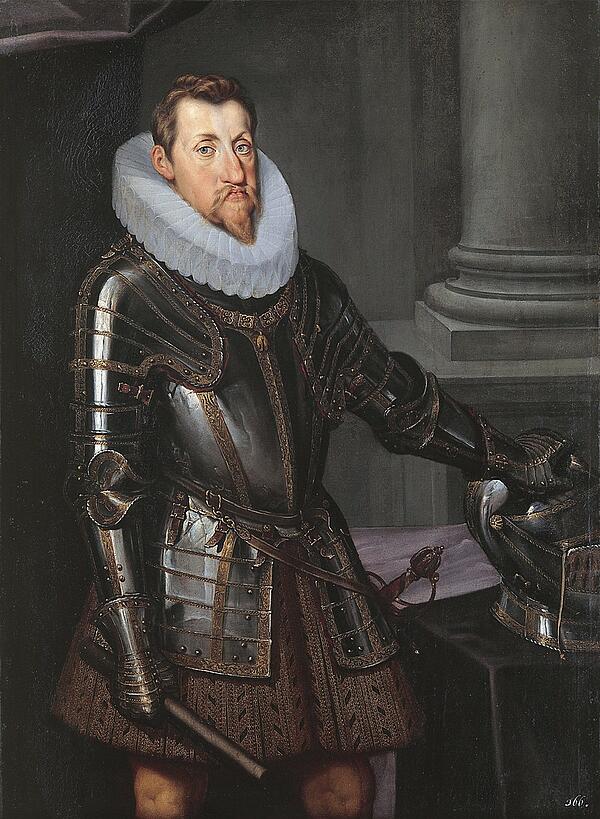Bohemia
Bohemia was at the centre of events in the outbreak of the Thirty Years War. Known as a religiously tolerant area, the region was a mixture of Calvinists, Catholics, Lutherans and Anabaptists. However, from 1618 to 1620, Bohemia was gripped by a revolt that was to trigger the Thirty Years War.

Rudolf II and Religion
About two-thirds of the population of Bohemia was Protestant and just 10 per cent were Catholic. However, the Bohemian nobility were disproportionately Catholic.
As a devout Catholic, Rudolf II, Holy Roman Emperor, wanted to make the region Catholic and remove all the Protestants.
Despite his ambitions for the region, in 1609 Rudolf gave Bohemia the right to effectively control their religious structure free from imperial interference. He agreed to this because he needed the support of Bohemia if he were to maintain his authority in the Empire. However, the agreement was only a temporary one.
When, in 1611, Rudolf did eventually attempt to assert his authority over Bohemia, the Bohemian Estates called on his brother Matthias to help them. As a reward, Matthias was crowned King of Bohemia. From 1611 to 1616 the region enjoyed relative peace.
Matthias
In 1612, Rudolf died and Matthias became Holy Roman Emperor. As he remained childless, the question arose of who would succeed the throne when he died. The Habsburgs wanted Archduke Ferdinand - a hard line Catholic who would not tolerate non-Catholics in Bohemia.
The archdukes decided that the archduke Ferdinand of Styria (the future emperor Ferdinand II) should succeed Matthias, who was old, ill, and childless, as emperor. Ferdinand was accepted as king of Bohemia in 1617 and crowned king of Hungary in 1618.
Ferdinand II and Bohemia
Ferdinand King of Bohemia was elected in June 1617. The Protestant in Bavaria were concerned over the appointment, but Ferdinand agreed to the Letter of Majesty - a document granting religious tolerance to both Protestant and Catholic citizens living in the estates of Bohemia.
Ferdinand was a devout Catholic whose negative regard of Protestantism cause immediate turmoil in Bohemia. He refused to uphold the religious liberties granted by the Letter of Majesty, which had guaranteed the freedom of religion to the nobles and the inhabitants of the cities.
Additionally, Ferdinand was an absolutist monarch and infringed several historical privileges of the nobles. He appointed 10 deputies to help him run Bohemia. Seven were Catholic and only three were Protestant, despite the Catholics only forming 20 per cent of Bohemia. Given the relatively great number of Protestants in the kingdom, including some of the nobles, the king's unpopularity soon caused the Bohemian Revolt.
The Bohemian Revolt
The Bohemian Revolt marked the first phase of the Thirty Years War - the Bohemian Phases. The revolt began when the Protestants threw two officials from a window - a symbolic act that became known as the Defenestration of Prague. This was in response to increasing persecution of the Protestants. In particular, in 1617 Roman Catholic officials in Bohemia closed Protestant chapels that were being constructed by citizens of the towns of Broumov and Hrob, thus violating the guarantees of religious liberty laid down in the Letter of Majesty of Emperor Rudolf II.
The Bohemians invited Frederick of Palatine, the Calvinist head of the Protestant League, to rule them. while Ferdinand II entered into an alliance with Maximilian and sent his imperial forces to help quash the rebellion. He also got support from Spain from his Catholic cousin Hapsburg king of Spain.
The Bohemian phase ended with the Battle of White Mountain, which saw the Emperor and the League under Tilly defeat the Protestant armies. The army of 30,000 Bohemians and mercenaries under Christian of Anhalt were defeated by 27,000 men of the combined armies of Ferdinand II, under Charles Bonaventure de Longueval, Count of Bucquoy and the German Catholic League under Johann Tserclaes, Count of Tilly. The battle marked the end of the Bohemian period of the Thirty Years' War.
After his defeat, Frederick of Palatinate was driven into exile and his dominions as well as electoral officer were handed over the Maximilian of Bavaria.
As a result Protestantism was almost crushed in Bohemia and the Catholics emerged triumphant. The loss of territory by Frederick caused significant concern across Bohemia and even Europe, with James I of England even attempting to reinstate Frederick in his dominions.
See also: Bohemia Implications
MLA Citation/Reference
"Bohemia". HistoryLearning.com. 2026. Web.
